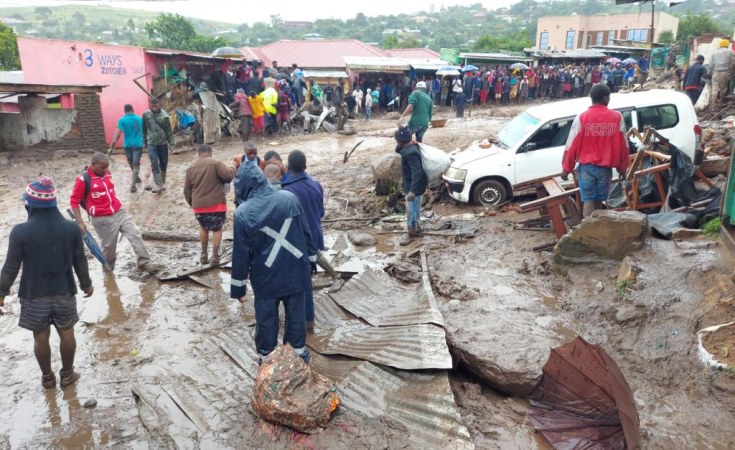Tropical cyclone Freddy is continuing its incredible and dangerous journey and is on track to break the record as the longest-lasting tropical cyclone on record. WMO is setting up an expert committee to evaluate this.
Freddy developed off the North Australian coast and became a named storm on 6 February. It crossed the entire South Indian Ocean and made landfall in Madagascar on 21 February and then in Mozambique on 24 February.
The storm spent several days tracking over Mozambique and Zimbabwe, bringing heavy rains and flooding. It then looped back towards the Mozambique Channel and picked up energy from the warm waters and moved towards the south-western coast of Madagascar.
Freddy is now moving away from Madagascar and is expected to intensify as it moves again towards Mozambique, according to WMO’s Regional Specialized Meteorological Centre La Réunion (Meteo-France). After bringing heavy rains to southern Madagascar, Freddy is heading to make a second landfall in Mozambique. It will bring yet more heavy rainfall, high winds (hurricane strength at the centre), high seas and a large storm surge. Expected rainfall amounts of 100 to 150 mm are forecast, and even twice as much near the core. Malawi is likely to receive cumulative rainfall of 100 mm in 24 hours.
Satellite derived from NOAA estimates that in the last seven days, parts of southern Mozambique has received 500 mm, and in the past month up to 700mm of rainfall which is well above the annual average. Madagascar has received more than 300 mm in the last seven days, or around three times the monthly average. Even before Freddy, there were problems with flooding because of heavy seasonal rainfall.
Early Warnings for All
"Freddy is having a major socio-economic and humanitarian impact on affected communities. The death toll has been limited by accurate forecasts and early warnings, and coordinated disaster risk reduction action on the ground - although even one casualty is one too many," said Dr Johan Stander, WMO Services Director.
"This once again underlines the importance of the UN Early Warnings for All initiative to ensure that everyone is protected in the next five years. WMO is committed to working with our partners to achieve this and tackle extreme weather and climate change related risks - one of the biggest challenges of our times," he said.
Four people have died in Madagascar due to the latest rains, bringing Freddy’s death toll to least 21 people (10 in Mozambique and 11 in Madagascar), according to the latest report from OCHA on 6 March.
Mozambique’s national disaster management agency INGD estimates that 1.75 Million people have been affected, with over 8,000 persons displaced.
A humanitarian operation is underway in the region and this will be challenged further when Freddy makes landfall again. Even before Freddy hit, Mozambique had been suffering flooding from heavy seasonal rains.
Potentially record-breaking storm
Meteorologically, Freddy has been a remarkable storm. The Australian Bureau of Meteorology, which acts as a WMO regional centre, named Freddy on 6 February a few hundred kilometers off the northwest coast of Australia.
Freddy tracked across the entire Indian Ocean from east to west, affecting Mauritius and La Réunion on its long journey en route to Madagascar. This kind of super zonal track is very rare. The most recent recorded cases were Tropical Cyclones Leon-Eline and Hudah, both in 2000, which like 2023 was a la Niña year.
WMO is monitoring whether Freddy will set a new record as the longest lasting tropical cyclone. It is likely that the WMO Weather and Climate Extremes evaluation committee will set up an investigation AFTER the cyclone has dissipated.
"The WMO Weather and Climate Extremes Archive are currently assembling a blue-ribbon international committee of scientists. Once the tropical cyclone has dissipated, these experts will begin a detailed examination of the raw data to determine if Freddy has indeed established a record as the longest-duration tropical cyclone on record. One question that we will be addressing is the fact that throughout its long lifetime, the storm has periodically weakened below tropical storm status. We will obviously need to address if that is a concern in our evaluation," said Prof. Randall Cerveny, WMO Weather and Climate Extremes rapporteur.
"Our evaluations are detailed scientific inquiries so they do take time," he said.
The current record is held by Hurricane/Typhoon John, which lasted 31 days in 1994.
According to NASA, Freddy has set the record for having the highest accumulated cyclone energy (ACE) of any southern hemisphere storm in history. ACE is an index used to measure the total amount of wind energy associated with a tropical cyclone over its lifetime.
The WMO Weather and Climate Extremes Archive gives details of records for temperature, precipitation, wind speed and more.
"World record or not, Freddy will remain in any case an exceptional phenomenon for the history of the South-West Indian Ocean on many aspects: longevity, distance covered, remarkable maximum intensity, accumulated cyclone energy (ACE) amount, impact on inhabited lands ... but it will be necessary to wait until the system ends its life cycle to make an exhaustive assessment;" said Sebastien Langlade, an responsible for tropical cyclone forecasting at RSMC La Réunion.


